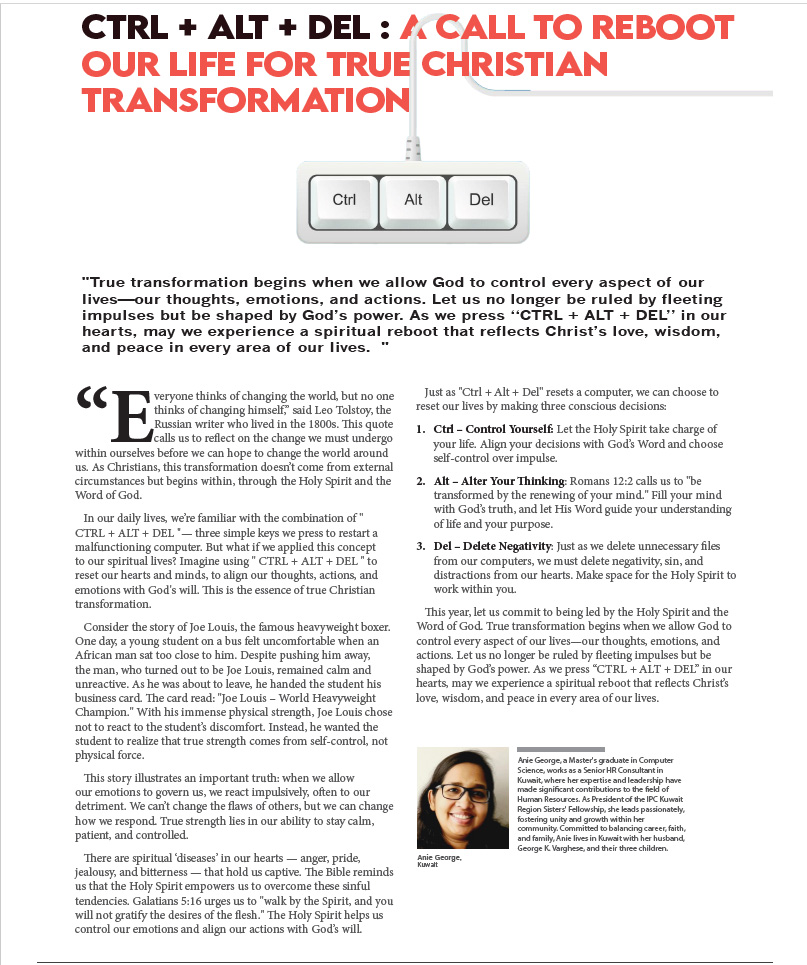Articles
How Psalm 100 teaches us how to practice true thanksgiving

We have been working through Psalm 100 and considering five principles that are critical for believers of Jesus Christ to understand as we reflect on the Lord’s call to give Him thanks.
The first principle was the Proclamation of Thanksgiving. The second is the Practice of Thanksgiving.
Notice verse 2. “Serve the LORD with gladness.” Then verse 4 toward the end: “Give thanks to Him.” These two statements, although perhaps not as evident in our translation, have official religious service ideas behind them. That’s why the NIV translates verse 2, “Worship the LORD with gladness,” recognizing the official worship behind the idea of service. Giving thanks, likewise has the idea of an official proclamation of thanksgiving, and together, these words point to a sacrifice of thanksgiving. The idea is the religious observance that someone who is truly thankful practices in their worship of the victorious King.
As we think about this, New Covenant believers, of course, no longer offer sacrifices because Jesus is the once-for-all, final, perfect sacrifice. To offer any other blood sacrifices, or to go back to the sacrifices commanded in the Mosaic Law, would be an insult to the blood of Christ. But the New Testament has many things to say about our acts of service that reflect thanksgiving. For example, in Hebrews 13:15-16, we find this: “Through Him (Jesus), then, let us continually offer up a sacrifice of praise to God.” Now, the letter to the Hebrews has been a long polemic against the Mosaic Law now that Christ has come with a better covenant, a better priesthood, a better everything! So, the writer immediately clarifies what he means when he says a sacrifice of praise to God: “That is, the fruit of lips that give thanks to His name. And do not neglect doing good and sharing, for with such sacrifices God is pleased.”
Here we see the New Covenant believer’s sacrifice of thanksgiving to God. It happens in community, because we can’t do good without someone else, a brother or sister, who benefits from our good work and sharing. The sacrifice of thanksgiving for the new covenant believer is not a ram or a bull or a goat or a grain offering, but it is lips that thank God out loud in the covenant community and a life that shows gratitude through generosity. That’s the practice of thanksgiving: gratitude reflected in word and deed.
The third principle contained in Psalm 100 is the Place of Thanksgiving.
Now this is fascinating. Notice verse 2 again. “Come before Him with joyful singing.” And the parallel is in verse 4: “Enter His gates with thanksgiving and His courts with praise.” This is a powerful truth. The place of thanksgiving, to put it simply, is before the face of God — in His presence.
When the Psalmist says in verse 2, “Come before Him with joyful singing,” he undoubtedly has the Temple in mind. That’s why in the parallel, he references the gates of God and the courts of God, which are clear references to Temple worship in Israel. This is significant for at least two reasons. First, remember the call-in verse 1 is to all the earth. God has called all nations to come into His temple to worship Him, thank Him, and give Him praise, honor, and glory.
Again, we have one of those mysteries in the Old Testament that could not be fully understood until Christ came. How are the Gentiles going to be able to come into the gates and courts of the Temple of Adonai Yawheh and worship Him? Aren’t they unclean and outsiders? Here, though, we see God calling all the earth to come into His temple, into His very presence, into the place where only holy people are allowed to come, to praise and thank Him.
Second, this is significant because it reminds us that when we give God thanks, we do so in His very presence. God is not far away, off in some other world, distant, watching us from afar as we give Him thanks. Not at all! Rather, when we come together for worship and to give Him thanks, and when we set aside time to show our gratitude to God, we are in His very presence, before His very face. The Lord is near. He hears us, and He is with us. Giving God thanks is a holy, personal communion with the living God. It is a joyful, song-filled, praise-filled, thanksgiving-filled time in presence of God.
The question this raises pertains to the temple. How do we, unclean sinners, get into the presence of God as acceptable to Him? How do we, especially we who are Gentiles, enter God’s courts and His gates? When John wrote his Gospel, the Jerusalem temple was gone, and based on some things John wrote it seems that worship without the temple was a question on many people’s minds, both within and without the church. It comes up in Jesus’ discussion with the woman from Samaria in John 4, where Jesus declares that a day would come when worship would not take place either in Samaria or in Jerusalem, but it would happen in Spirit and truth, almost as if Spirit and truth were geographic locations.
Earlier, in John 2, Jesus told the Jews that if they destroyed the temple, He would raise it up in three days. They were incredulous since it took 46 years to build the temple, but John notes in John 2:21, “But He was speaking of the temple of His body.” The disciples took a while to understand the significance of this. “So, when He was raised from the dead, His disciples remembered that He said this; and they believed the Scripture and the word which Jesus had spoken.” They didn’t get it until after the resurrection. Jesus essentially said, “You try to come into the presence of God by going into a building. The true path to the presence of God is Me. If you want to enter into the gates of God, if you want to enter His courts, if you want to come before Him, I am the only way.”
The place of thanksgiving, then, is in the presence of God not through being in a geographic location but by being in Christ. That’s why Paul wrote in Ephesians 2:18, “For through Him we both (Jews and Gentiles alike) have our access in one Spirit to the Father.”
If we are in Christ, we give thanks to God, not at a distance, but in His very presence, before His face. What a glorious truth that we have access through Jesus to the very presence of God, to the holiest place, and not only that, but God in this Psalm has called us to enter there to give Him thanks.
Sources:Christian Post
Articles
CTRL+ALT+DEL: A call to reboot our life for true Christian transformation
Articles
7 ways we rebuild through Christ

When a person comes to Christ, it’s not just about being forgiven and waiting for heaven. Salvation is an ongoing process of regeneration where a person becomes a new creation, reshaped by the power of the cross. This process involves rebuilding every area of life according to God’s design. Today, we’ll explore seven key areas that are rebuilt in Christ.
1. Our personal life is no longer based on self
We are born in sin and naturally live according to the lusts of the flesh (Ephesians 2:1-3).
But in Christ, we begin to live a cross-shaped life, learning to deny ourselves and follow Jesus (Mark 8:34-36).
“And calling the crowd to him with his disciples, he said to them, ‘If anyone would come after me, let him deny himself and take up his cross and follow me’” (Mark 8:34-36).
The crucified life is a life where self is no longer at the center — God is. We are called to serve others, rather than live for self-gratification(Galatians 2:19-20).
We actually find our life when we lose it! We discover the best version of ourselves when we die to ourselves and allow Christ to live in us and through us.
2. Our families are shaped according to God’s Word
After coming to Christ, family life should be rebuilt and shaped by Scripture. One way is to disciple our children and teach them about God.
Psalm 78:5-7:
“He established a testimony in Jacob and appointed a law in Israel, which he commanded our fathers to teach to their children, that the next generation might know them, the children yet unborn, and arise and tell them to their children, so that they should set their hope in God.”
Furthermore, parents are instructed to raise their children according to the Word of God, ensuring that our homes reflect biblical values and generational faithfulness (2 Timothy 3:15-16).
3. We do business God’s way
The Bible teaches that work is not merely a means to provide for ourselves; it is an act of worship.
Genesis 2:15 illustrates that Adam was called to work even before he had a wife and children. It was an act of worship since, as His image bearer, he imitated the God who worked 6 days before He entered His rest.
“The LORD God took the man and put him in the garden of Eden to work it and keep it.”
Like Adam, we work because we are made in the image of a God who worked to create the world. In business, we walk in integrity, treat employees as partners, equip them to flourish in work, and prioritize honoring God. This means creating environments that reflect God’s kingdom values, including allowing people to worship on Sundays.
4. We use our wealth to spread the Kingdom
Deuteronomy 8:18 reminds us that God gives us the ability to produce wealth, not just for personal gain, but to advance His Kingdom. As believers, we are called to steward our finances in a way that reflects God’s mission, investing in the expansion of the gospel, meeting needs, and helping to establish justice and mercy on earth.
Money is not evil, but the love of money is evil. Money can also be used to advance the kingdom.
I.E., God was able to use “The Good Samaritan” because he had wealth (Luke 10).
God used Joseph of Arimathea who buried the body of Jesus because he had financial resources.
God used Lydia, who had her own business and started a church because she owned a home and was a business owner (Acts 16).
5. We are called to reflect Christ by serving our communities
Titus 2 and 3 show us that we are not just called to serve within the walls of the church, but to be profitable to all people.
2:7 says “Show yourself in all respects to be a model of good works …”
2:14 says Jesus purified people “who are zealous for good works.”
3:14 says “let our people learn to devote themselves to good works …”
This means our communities should see the light of Christ through our good works.
History is replete with how Christ’s followers have rebuilt cities and nations and served humanity in a way that forever impacted nations.
Isaiah 61:4 says:
“They shall build up the ancient ruins; they shall raise up the former devastations; they shall repair the ruined cities, the devastations of many generations.”
6. The Church is called to reparent and rebuild individuals
Jesus’ invitation to “follow me, and I will make you …” demonstrates the Church’s role in rebuilding lives (Matthew 4:19). Through biblical discipleship, we help people discover their God-given purpose and destiny.
Discipleship is more than instruction; it’s walking with people to see them transformed and equipped to fulfill their calling in Christ.
Jesus didn’t say, “follow me and I will give you a weekly bible study. He gave people the opportunity to do life with Him, which created the environment to make disciples and bring about personal transformation.
7. The Church participates in the renewal of all things in Christ
God called Adam to bring His influence on the whole earth.
Genesis 1:28. God’s ultimate plan with and through the church participating with Jesus is to renew all things through Christ (Ephesians 1:9-11). We are not just waiting for the second coming; we are active participants in the restoration of creation through the gospel. As we live in alignment with God’s kingdom, we anticipate the fulfillment of this promise in the climax of history with a new heaven and new earth (Revelation 21:1-8).
Five practical takeaways
1. Embrace daily denial of self: Evaluate your life and ask where you need to surrender personal desires in favor of following Christ. This is the first step toward living a cross-shaped life.
2. Create a family discipleship plan: Begin setting time aside weekly to disciple your children or encourage your family members in the Word of God. Make your home a center for spiritual growth.
3. Work with integrity and purpose: Consider how your work can reflect God’s glory. Are you treating your employees or coworkers with dignity and empowering them, or are you merely using them to get your work done?
4. Be a faithful steward of wealth: Make a decision to invest in Kingdom causes. Pray about where your resources can make a Gospel-centered impact — supporting missionaries, funding outreach, or caring for the poor.
5. Serve your community: Identify a way to serve your community this week. Whether it’s through volunteering, meeting a need, or simply being present in a meaningful way, show Christ’s love in action.
As we participate in this process of rebuilding, God transforms us, our families, our work, and, ultimately, the world around us. Let us surrender fully to Christ and trust Him to rebuild every aspect of our lives for His glory.
Sources:Christian Post
Articles
God’s peace and the world’s peace are not the same

Peace is not just a feeling, it is also a condition, a mindset, a state of being. It is a relationship with God Almighty who created you and loves you. Peace is where we want to live. But we live in an unpeaceful world full of strife, envy, jealousy, rage, competition, anxiety, fear, worry, and yes lust. We crave what we don’t have, and we don’t want what we do have. We long for peace.
The peace of God is the opposite of all that the world has to offer.
The world’s definition of peace is a state of tranquility, freedom from disturbance, and harmony in personal relations.
Who doesn’t want that?
Now listen to the story of Jesus and the peace He offers you and me.
“And the angel said to them, ‘Fear not, for behold, I bring you good news of great joy that will be for all the people. For unto you is born this day in the city of David a Savior, who is Christ the Lord. And this will be a sign for you: you will find a baby wrapped in swaddling clothes and lying in a manger.’ And suddenly there was with the angel a multitude of the heavenly host praising God and saying, ‘Glory to God in the highest, and on earth peace among those with whom he is pleased!’” (Luke 2:10).
Jesus comes to give peace!
Now you may think you know what peace is. But listen to what Jesus says about it,
“’Let not your hearts be troubled. Believe in God; believe also in me. In my Father’s house are many rooms. If it were not so, would I have told you that I go to prepare a place for you? And if I go and prepare a place for you, I will come again and will take you to myself, that where I am you may be also. And you know the way to where I am going.’ Thomas said to him, ‘Lord, we do not know where you are going. How can we know the way?’ Jesus said to him, ‘I am the way, and the truth, and the life. No one comes to the Father except through me’” (John 14:1).
Look at what Jesus also says in John 14:27: “Peace I leave with you; my peace I give to you. Not as the world gives do I give to you. Let not your hearts be troubled, neither let them be afraid.”
Jesus is the way to peace. And you may say, “Oh, I know what peace is!” But you don’t. You don’t know what peace is until you know Jesus. His peace is not like the world’s peace.
If you know Jesus, you will experience peace. If you don’t know Jesus, you won’t. Not in any real sense, that is.
The peace of God is a state of wholeness, calmness, and completeness.
As you compare the two definitions, the world’s definition of peace is an external definition based off circumstances and human relationships.
If you are trying to get to a permanent condition of peace based off external circumstances and human relationships, you are going to be more unpeaceful than you are now. The peace the world offers you is circumstantial. The peace God offers you is complete, consistent, whole, and perfect regardless of what is going on in your life. It doesn’t come from without, it comes from within.
Let me explain. When Jesus returned to Heaven he promised to send the Holy Spirit.
“These things I have spoken to you while I am still with you. But the Helper, the Holy Spirit, whom the Father will send in my name, he will teach you all things and bring to your remembrance all that I have said to you”(John 14:26).
The Greek Word here is Paracletos, “the one who comes along side” or the Comforter. The Peace giver! Jesus left earth and sent the Holy Spirit to live inside of us. Now look at the fruit of the Spirit that lives inside you:
“But if you are led by the Spirit, you are not under the law. Now the works of the flesh are evident: sexual immorality, impurity, sensuality, idolatry, sorcery, enmity, strife, jealousy, fits of anger, rivalries, dissensions, divisions, envy, drunkenness, orgies, and things like these. I warn you, as I warned you before, that those who do such things will not inherit the kingdom of God. But the fruit of the Spirit is love, joy, peace, patience, kindness, goodness, faithfulness,23 gentleness, self-control; against such things there is no law” (Galatians 5:18).
How do we unwrap God’s gift of peace in our lives? You and I must accept Jesus as God’s peace to the world. We must realize the world’s peace and God’s peace are not the same. True peace comes when we follow Jesus and not our own wishes or wants.
I don’t have to be worried because Jesus is my peace. I don’t have to be jealous because Jesus is my peace. I don’t have to be angry because Jesus is my peace. He has sent the Holy Spirit to live in me. I just need to keep in step with Him as He leads me into the peace He has for me in Jesus’ name.
Sources:Christian Post
-

 Travel10 months ago
Travel10 months agoയാക്കൂസ കരിഷ്മ:ഓല സ്കൂട്ടറിനേക്കാൾ വിലക്കുറവിൽ കുഞ്ഞൻ കാർ; സിറ്റി യാത്രകൾക്ക് ഇനി ഇവൻ മതിയാവും
-

 Movie4 months ago
Movie4 months agoFor KING + COUNTRY Stars’ Big Plan to Bring Message of Jesus, ‘Redemption of Humanity’ to People Across America
-

 Tech8 months ago
Tech8 months agoചിത്രങ്ങൾ എഡിറ്റ് ചെയ്യാം; വാട്സ്ആപ്പിലെ ‘നീല വളയം’ സ്മാർട്ടാകുന്നു, കാര്യമായ മാറ്റങ്ങൾ
-

 Movie4 months ago
Movie4 months agoFor KING + COUNTRY Stars’ Big Plan to Bring Message of Jesus, ‘Redemption of Humanity’ to People Across America
-

 Movie12 months ago
Movie12 months agoActor Ryan Phillippe ‘Craving’ Relationship With God After Movie About Christian Missionary
-

 Articles9 months ago
Articles9 months ago8 ways the Kingdom connects us back to the Garden of Eden
-

 world news3 weeks ago
world news3 weeks agoമ്യാന്മറില് സായുധസംഘത്തിന്റെ വെടിയേറ്റ് കത്തോലിക്ക വൈദികന് കൊല്ലപ്പെട്ടു.
-

 Hot News11 months ago
Hot News11 months ago3 key evidences of Jesus’ return from the grave

























